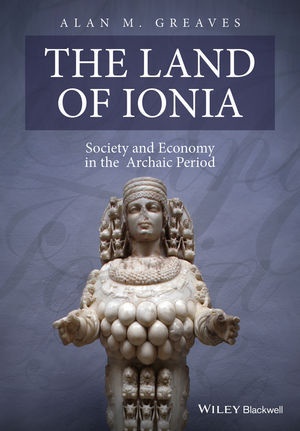Read more
Incorporating over a century of archaeological research, Greaves offers a reassessment of Archaic Ionia that attempts to understand the region within its larger Mediterranean context and provides a thematic overview of its cities and people.
* Seeks to balance the Greek and Anatolian cultural influences at work in Ionia in this important period of its history (700BC to the Battle of Lade in 494BC)
* Organised thematically, covering landscape, economy, cities, colonisation, warfare, cult, and art
* Accesses German and Turkish scholarship, presenting a useful point of entry to the published literature for academics and students
List of contents
List of illustrations viii
List of tables x
Preface xi
Acknowledgments xiv
Prologue xvi
1 FINDING IONIA 1
Introduction 1
The Source Materials 2
Excavation and Publication 22
Conclusions 26
2 CONSTRUCTING CLASSICAL ARCHAEOLOGIES OF IONIA 27
Introduction 27
Traditional Approaches to Classical Archaeology in Ionia 28
The German and Turkish "Schools" of Archaeology 32
Annaliste Perspectives on Archaeology 36
A New Approach to the Land of Ionia 39
Conclusions 43
3 A DYNAMIC LANDSCAPE 45
Introduction 45
Ionia's Geographical Zones 46
Landscape Dynamism 57
The Ionian Landscape and Ionian Identity 65
Conclusions 67
4 THE WEALTH OF IONIA 69
Introduction 69
Modes of Primary Production 71
Modes of Processing 79
Modes of Exchange 84
Ionia and World Systems 89
Conclusions 91
5 THE CITIES OF IONIA 95
Introduction 95
A Brief Survey of the Ionian Cities 96
Other Settlements in Ionia 107
The Size and Distribution of Poleis within Ionia 110
François de Polignac in Ionia 112
The City and Ionian Identity 115
Conclusions 118
6 THE IONIANS OVERSEAS 120
Introduction 120
Source Materials 121
Interpreting the Evidence 129
Colonial Interactions 131
Models of Ionian Colonization 137
Conclusions 143
7 THE IONIANS AT WAR 145
Introduction 145
Geographical Settings 147
Archaeological Contexts and Materials 148
Literary Sources 154
Discussion: Issues in Source Materials 156
The Fortification of Ionia 156
Naval Warfare 164
Mercenaries 166
Conclusions 168
8 CULTS OF IONIA 171
Introduction 171
Geographical Evidence 172
Archaeological Evidence 174
Contents vii
Literary and Epigraphic Evidence 179
Discussion of Source Materials 180
The Sacred Ways of Ionia 180
"Foreign" Influences on Ionian Cult 193
Burial Practices in Ionia 197
Conclusions 199
9 THE ORNAMENTS OF IONIA 201
Introduction 201
"Art" and Landscape 203
Ionia's Lost "Art" Treasures 203
"Art" and Literature 207
"Connoisseurship" of Ionian Pottery 207
"Reading" Ionian "Art" 214
Conclusions 218
10 WHO WERE THE IONIANS? 219
Introduction 219
Herodotos' Ionia 219
The Myth of the Ionian Migration 222
Ionian Identity and Archaeology 225
Conclusions 227
Epilogue 231
Glossary of ancient Greek [and modern Turkish] terms used in the text 233
Bibliography 235
Index 255
About the author
Alan Greaves is Lecturer in Archaeology at The University of Liverpool. He is the author of
Miletos: A History (2002) and the editor of the volume
Transanatolia (2007). He has also written numerous articles on Bronze Age-Iron Age archaeology in Turkey, Ionia, and Greek Colonization.
Summary
During the formative years of the archaic period, Ionia was one of the most important regions of the ancient world; however, Ionia s local identity has often been overlooked in scholarly works. This long overdue study of Archaic Ionia seeks to redress this omission.

